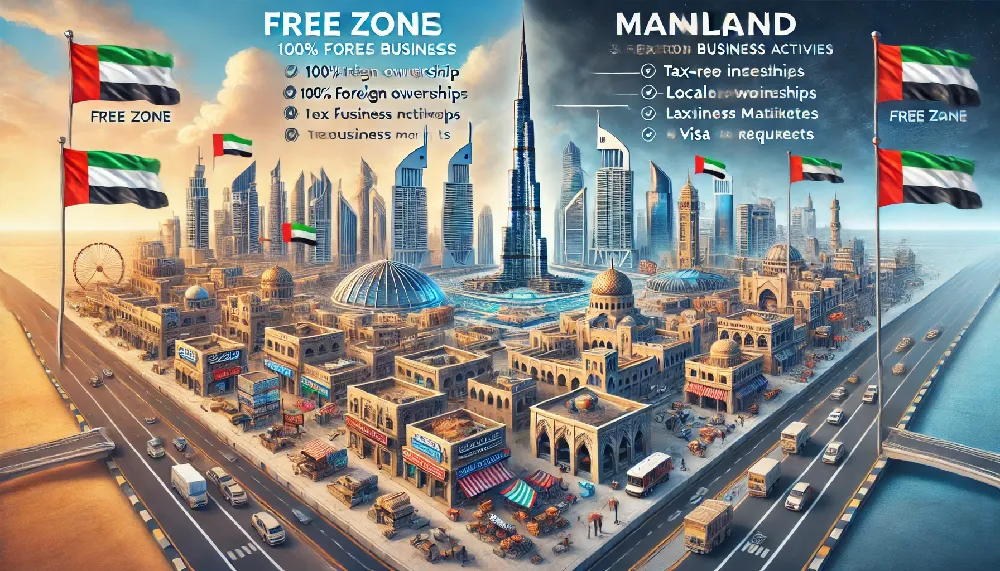
When delving into the intricate landscape of business in the United Arab Emirates (UAE), entrepreneurs face the decision of establishing their operations in either a free zone or on the mainland. It is crucial to grasp the distinctions between these options to align decisions with specific business requirements and regulatory obligations. This analysis will examine the key similarities and variances between free zones and mainland territories in terms of initiating a business venture in Dubai or any other location within the UAE as a hub for your business activities.
Free Zones: Free zones within the UAE are designated special economic regions established and managed by the government to attract foreign investments. These zones offer advantages such as complete foreign ownership, tax exemptions, and efficient import/export procedures, making them alluring to businesses seeking global expansion. Moreover, free zones typically boast top-tier infrastructure and amenities, along with a robust support network that aids businesses. The autonomy granted on administrative and regulatory matters enables Free Zones to cultivate a conducive environment for innovation and growth.
Mainland: Referring to areas within the UAE that are not encompassed by free zones as defined by local authorities. Mainland enterprises have the flexibility to operate from any part of the UAE and cater to both local and international markets. They enjoy unrestricted trade directly with the local market, providing a competitive edge to companies targeting the domestic market in UAE. Additionally, mainland firms can compete for government projects and contracts which are usually not accessible to free zone entities.
Legal and Regulatory Framework: Free Zones function under distinct legislation offering a regulated business environment equipped with essential infrastructure, simplified processes, and regulations tailored for servicing foreign investors. These jurisdictions have their own laws that are generally more lenient compared to those governing mainland operations. Lee Yaroslav, a special counsel specializing in real estate at the New Jersey Department of Law and Public Safety, highlighted that free zones' autonomy expedites business setups by minimizing bureaucratic obstacles – thus fostering efficiency in operations. Industry-specific services and facilities are available for entrepreneurs in tech, media, healthcare, and logistics sectors. Companies operating in the mainland of the UAE are governed by federal laws and must comply with regulations set by the Department of Economic Development (DED), aligning their business practices with traditional legal frameworks of the country. While setting up a business in the mainland may involve more complexities compared to free zones, it offers the advantage of operating nationwide and engaging directly with local markets. The mainland jurisdiction upholds a robust framework encompassing intellectual property, contract, and commercial laws, instilling confidence in businesses regarding operational stability within the regulatory environment.
In contrast, free zones provide companies with greater flexibility such as 100% foreign ownership, lower registration costs, simplified investor visas, and streamlined employee visa processes. These zones allow businesses to have varying ownership structures which can be especially appealing for international enterprises. The simplified visa procedures in free zones enable easy recruitment of non-citizens, leveraging foreign expertise in their workforce. Additionally, free zones often grant residency visas to business owners and their families, making them an attractive option for expatriates relocating to the UAE.
Notably, companies operating in the mainland are required to have a local sponsor or partner holding at least 51% ownership. However, recent changes in UAE legislation aim to relax these ownership restrictions as part of efforts to attract more foreign investments. This shift extends to allowing certain business activities and sectors to have full foreign ownership without necessitating a local sponsor. These reforms contribute to enhancing the UAE's attractiveness as an investment hub and reinforcing its global competitiveness. The visa process for mainland operations is comprehensive ensuring that jobs filled by foreign workers adhere to national employment standards. Businesses seeking expansion and increased hiring opportunities can leverage mainland companies for visa sponsorship at a larger scale compared to free zone entities. Mainland companies offer substantial tax benefits by exempting corporate and personal income taxes, as well as customs duties based on the business type, thereby leading to significant cost savings. These tax incentives aim to attract foreign investments and encourage business establishments within free zones. Additionally, free zone enterprises enjoy exemptions from import/export duties and personal income taxes, along with VAT exclusions on goods and services traded within their premises, fostering a tax-efficient environment that facilitates business growth and reinvestment. On the other hand, mainland operations provide specific industries with tax breaks and incentives under UAE's business-friendly tax regulations, featuring minimal federal taxes globally. Chinese firms operating on the mainland can access various government grants, subsidies, or favorable tax policies tailored to specific sectors, resulting in substantial reductions in operational costs. The implementation of Economic Substance Regulations ensures that mainland-based companies actively contribute to the UAE economy, driving progress and advancement.
Regarding Business Activities and Licensing flexibility, free zones serve as optimal locations for trade, manufacturing, and service enterprises seeking simplified licensing procedures within a foreign-friendly setting. Free zones are specialized for particular industries, offering tailored infrastructure, products, and services to cater to their unique requirements. Establishing businesses in free zones is streamlined through straightforward licensing processes that enable swift acquisition of UAE licenses for expedited operations commencement. Furthermore, these zones provide an array of trade license options—such as trading licenses, service licenses, or industrial/freelance permits—tailored to suit the nature of each business activity intended therein. Mainland business setups in the UAE cater to companies seeking entry into the local market, providing more flexibility compared to free zones in terms of authorized activities and geographical reach within the country. Unlike free zones, which can impose certain restrictions, Mainland businesses offer the advantage of being able to rent office spaces anywhere and operate without industry-specific constraints. Retailers, in particular, stand to benefit from operating outside designated zones by gaining access to higher profit margins for commercial properties. The Department of Economic Development (DED) offers a comprehensive list of business activities for entrepreneurs to choose from based on their specific needs.
Licensing procedures for Mainland businesses are designed to ensure compliance with national regulations while also allowing for adjustments to align with changing market dynamics and business requirements. Understanding the distinction between free zones and Mainland setups is crucial for entrepreneurs and investors looking to establish a successful presence in Dubai. Seeking advice from legal and relocation experts like JUDr. Gabriela Hornáčková, LL., along with support from Liberty Corporate Business, can streamline the process of setting up a business with confidence.

For personalized guidance on establishing your business in the UAE, consider consulting professionals such as GH LEGAL s.r.o. through face-to-face meetings. Making informed decisions about the type of company setup can lead to maximizing benefits and launching a prosperous venture in one of the rapidly growing regions like the UAE.






































